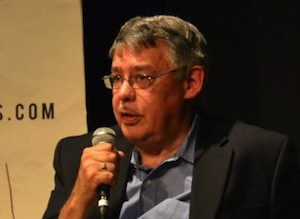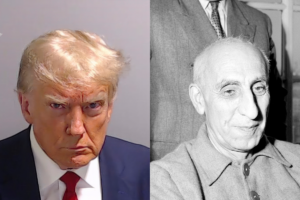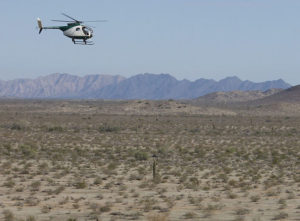Truthdigger of the Week: Juan Gonzalez
“Democracy Now!” co-host and award-winning journalist Juan Gonzalez has brought a deep understanding of the United States' historical relationship with Latin America to bear on immigration issues affecting all Americans in the present. The "Democracy Now!" co-host has brought a deep understanding of the United States' historical relationship with Latin America to bear on immigration issues.
“Democracy Now!” co-host and award-winning journalist Juan Gonzalez has brought a deep understanding of the United States’ historical relationship with Latin America to bear on immigration issues affecting all Americans in the present.
“Mine is the perspective of a Latino who has grown tired of having our story told, often one-sidedly, without the passion or the pain, by ‘experts’ who have not lived it,” Gonzalez wrote in “Harvest of Empire: The History of Latinos in America.” Published in the final years of the Clinton presidency and recently released in the form of a gripping documentary film, the book has helped wrench Latin American history as taught to U.S. students from the hands of historians who do not always share the social concerns of the people whose history they were recording.
That history has played out in the United States in a series of migrations precipitated by actions the American government took in Mexico, the Caribbean and Central America over the course of many decades. Thousands upon thousands of people were either recruited to work in the United States or fled from violence and oppression stirred in their countries by the actions of American administrations and businesses. As Gonzalez explains:
[Immigration] has increasingly become an issue, not just in the big cities — New York, L.A., Miami — but in the heartland of America, and especially in the South, where in North Carolina, for instance, there’s been a huge increase in the Latino population of North Carolina, but most people don’t understand how those Latinos got there. It’s a largely Guatemalan migration, and it’s largely people who were recruited in the ’80s and ’90s to come and work in the textile mills of North Carolina, because—part of what I try to show in the book is the enormous connection between the needs of capital of American expanding industries in the United States and this recruitment of labor.
So, what happened basically is, in the ’80s, as more and more Salvadorans and Guatemalans were fleeing into the United States as a result of the civil wars in their countries and the repression in their countries, they came here to the United States, and there were industries that needed cheap labor. And so, you had the meatpacking industry in the Midwest [begin] recruiting many Mexicans to come to Dodge City and to come to Des Moines and to come to all of these — the meat center of the country. And you had the poultry industry in Arkansas, and you had the textile industry in North Carolina. And they usually went by nationality. So you had a large Guatemalan population that developed in North Carolina. So, I think that’s part of what I try to show in the book. And to a large measure, the film captures this process of migration: the push of the repression that occurs in the countries, in the sending countries, and the pull of American businesses seeking cheap labor.
Born in Puerto Rico in 1947, Gonzalez came to the United States in the wave of Puerto Rican migrants that hit American shores in the immediate postwar period. He spent his childhood among other immigrant communities in East Harlem and Brooklyn. Though the English language made school a challenge at first, Gonzalez became editor of his high school newspaper and went on to study at Columbia College in Manhattan. There, during the Vietnam War, he embraced the anti-war movement and helped organize protests that shut down the college in spring 1968. He went on to become a columnist for the New York Daily News in 1988. He won the George Polk Award for investigative reporting in 1998, a Lifetime Achievement Award from the Hispanic Academy of Media Arts and Sciences, and a Justice in Action Award in 2010.
From the beginning of their arrival through the present, the people Gonzalez describes have been outsiders and easy scapegoats for politicians and other leaders looking to divert public attention from the genuine sources of America’s economic and political problems. Throughout his career in journalism, he has honored his roots by helping us hear the voices rarely given a microphone by the mainstream media. For that continued effort, we honor Juan Gonzalez as our Truthdigger of the Week.
— Posted by Alexander Reed Kelly.
Your support matters…Independent journalism is under threat and overshadowed by heavily funded mainstream media.
You can help level the playing field. Become a member.
Your tax-deductible contribution keeps us digging beneath the headlines to give you thought-provoking, investigative reporting and analysis that unearths what's really happening- without compromise.
Give today to support our courageous, independent journalists.






You need to be a supporter to comment.
There are currently no responses to this article.
Be the first to respond.